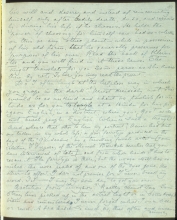Страница 11
his will and desire, and instead of reincarnating himself only after bodily death, do so, and repeatedly — during his life if he chooses. He holds the power of choosing for himself new bodies — whether on this or any other planet — while in possession of his old form, that he generally preserves for purposes of his own. Read the book of Khiu-tee and you will find in it these laws. She might translate for you some paras, as she knows them by rote. To her you may read the present.
Do I often laugh at "the helpless way in which you grope in the dark?" Most decidedly not. That would be as unkind and about as foolish for me to do as for you to laugh at a Hindu for his pidgin English, in a district, where your Government will not teach people English. Whence such a thought? And whence that other to have my portrait? Never had but one taken, in my whole life; a poor ferrotype produced in the days of the "Gaudeamus" by a travelling female artist — (some relative, I suppose, of the Munich Beer-Hall beauties that you have interviewed of late) — and from whose hands I had to rescue it. The ferrotype is there, but the image itself has vanished: the nose peeled off and one of the eyes gone. No other to offer. I dare not promise for I never break my word. Yet — I may try — some day to get you one.
Quotation from Tennyson? Really cannot say. Some stray lines picked up in the astral light or in somebody's brain and remembered, I never forget what I once see or read. A bad habit. So much so, that often and unconsciously



Khiu-tee: according to David Reigle, the Kiu-Te (Tib. rGyud-sde) is a section of the "Kangyur" (Tib. bKa'-'gyur), a collection of Tibetan Buddhist sacred literature divided into two kinds, "mDo-sde" (sutras) and "rGyud-sde" (tantras).
ferrotype is a tintype, or a positive photograph made by a collodion process on a thin iron plate having a darkened surface.
"Gaudeamus" probably refer to "Gaudeamus Igitur" ("So Let Us Rejoice"), a popular academic song in many Western countries, mainly used at university graduation ceremonies. The current Latin lyrics were published in 1781.